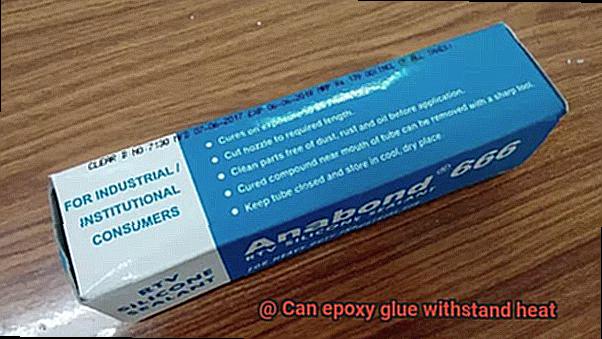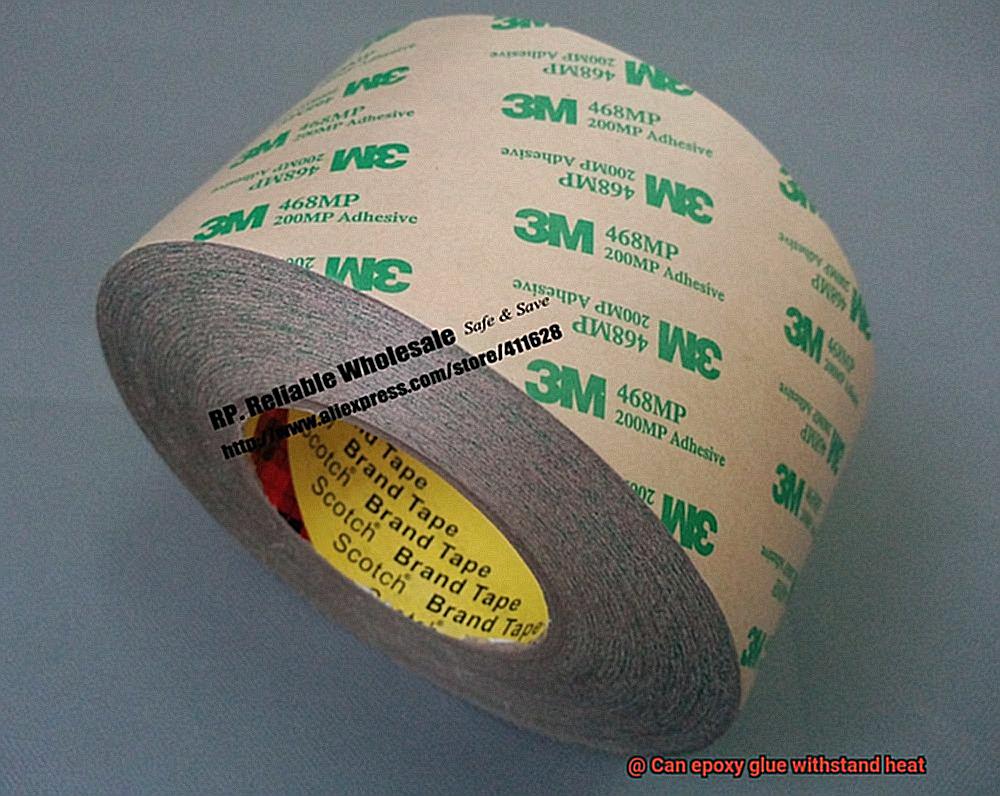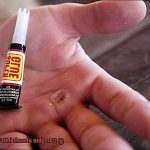Do you ever find yourself in a sticky situation, needing an adhesive that can handle tough jobs? Epoxy glue is a popular choice for its strength and durability. But when it comes to high temperatures, can epoxy glue really hold up? In this blog post, we’ll dive into the science behind epoxy glue and explore its ability to withstand heat.
Imagine cooking up a storm in your kitchen when suddenly, the handle on your non-stick frying pan comes loose. You grab your trusty epoxy glue, but will it be able to handle the heat of your stove? The answer may surprise you.
We’ll take a closer look at the properties of epoxy glue and how it reacts to heat. We’ll also examine the different types of epoxy glue available and which ones are best suited for withstanding high temperatures. And if you’re concerned about potential dangers when using epoxy glue with high heat, don’t worry – we’ve got you covered with tips on how to safely handle the adhesive in these situations.
Whether you’re a DIY enthusiast or professional tradesperson, this blog post provides valuable insights into one burning question: Can epoxy glue withstand heat? So sit back, relax, and read on to discover everything you need to know about this versatile adhesive and its ability to endure even the hottest conditions.

What is Epoxy Glue?
Contents
- 1 What is Epoxy Glue?
- 2 How Does Epoxy Glue Work?
- 3 What Temperature Can Epoxy Glue Withstand?
- 4 Factors Affecting Heat Resistance of Epoxy Glue
- 5 Advantages of Using Epoxy Glue for High-Temperature Applications
- 6 Disadvantages of Using Epoxy Glue for High-Temperature Applications
- 7 Types of High-Temperature Resistant Epoxy Glues Available
- 8 Tips for Choosing the Right Type of High-Temperature Resistant Epoxy Glue
- 9 Conclusion
Epoxy glue is a remarkable adhesive that has become a staple in construction, manufacturing, and household repairs. It is a two-part adhesive made up of resin and hardener, which, when mixed together, create an incredibly strong bond that can withstand significant stress and strain.
One of the most notable benefits of epoxy glue is its excellent bonding properties. It can adhere to a wide range of materials, including metal, plastic, wood, and glass, making it a versatile adhesive for all types of projects. Additionally, epoxy glue is highly resistant to water, chemicals, and other environmental factors, ensuring a long-lasting bond that won’t break down easily.
Another significant advantage of epoxy glue is its ability to withstand high temperatures. Epoxy adhesives are known for their high temperature resistance properties, making them suitable for use in high-heat applications such as industrial ovens and furnaces. Some types of epoxy glue can even withstand temperatures up to 600°F (315°C), making them an ideal choice for high-temperature bonding needs.
However, it’s important to note that not all types of epoxy glue can withstand high temperatures. The ability of epoxy glue to resist heat depends on several factors such as the type of epoxy glue used and the temperature range it is exposed to. Therefore, choosing the right type of epoxy glue for your application is crucial.
In general, most types of epoxy glue are designed to withstand temperatures ranging from -20°C to around 80°C, which is suitable for most indoor applications. However, if you need an epoxy glue that can withstand high temperatures above its recommended range, you should look for specific types of epoxy glues that are specially formulated with high-temperature resistance properties.
How Does Epoxy Glue Work?
This versatile and durable two-part adhesive is perfect for a wide range of applications, from construction to household repairs.
So, how does epoxy glue work? It’s all in the chemistry. Epoxy glue consists of two components: a resin and a hardener. The resin is typically made from bisphenol-A (BPA) and epichlorohydrin, while the hardener is made from polyamine or amidoamine. When these two components are mixed together, they undergo an exothermic chemical reaction that creates a strong and long-lasting bond.
The key advantage of epoxy glue is its ability to withstand high temperatures. When the two components are mixed together, the chemical reaction that occurs generates heat, which helps to cure the adhesive and create a strong bond. Epoxy glue can typically withstand temperatures up to 200°F (93°C) for short periods of time, making it ideal for use in high-heat environments such as engine compartments or ovens.
However, it’s important to choose the right type of epoxy glue for your specific application. Factors such as its specific formulation, thickness of the bond, and duration of exposure to heat can impact its heat resistance. If you’re working in an environment with extreme temperatures or prolonged exposure to heat, be sure to choose a specialized high-temperature epoxy that can withstand these conditions.
What Temperature Can Epoxy Glue Withstand?
Epoxy glue is a versatile adhesive that has earned its place in various industries, including construction, automotive, and aerospace. Its strength and durability make it an ideal choice for high-heat environments. However, there is a common question that arises when it comes to epoxy glue: what temperature can it withstand without losing its adhesive properties?
The answer to this question depends on several factors, including the type of epoxy glue used and the temperature it is exposed to. Generally speaking, most epoxy glues can withstand temperatures between 150-200°C (302-392°F) without losing their adhesive properties. This range is sufficient for many applications.
However, if you require an epoxy glue that can handle even higher temperatures, there are options available. Some high-temperature epoxy glues are specifically designed for use in extreme heat and can endure temperatures up to 315°C (600°F). These types of epoxy glues are commonly used in the aerospace and automotive industries.
It’s important to keep in mind that prolonged exposure to high temperatures can cause any epoxy glue to break down and lose its adhesion properties. Even if an epoxy glue is rated for high temperatures, it’s critical to monitor its performance under high-temperature conditions closely.
When choosing an epoxy glue for a high-heat application, there are several factors to consider. Here are some things to keep in mind:
- Type of epoxy glue: selecting an epoxy glue that is explicitly designed for high-temperature environments is crucial.
- Duration of exposure: even if the chosen epoxy glue is rated for high temperatures, prolonged exposure can cause it to fail.
- Compatibility with materials: make sure the epoxy glue is compatible with the materials being bonded.
Factors Affecting Heat Resistance of Epoxy Glue
Epoxy glue is a popular adhesive due to its high strength and durability, but its ability to withstand high temperatures is a common concern. When using epoxy glue in applications where it will be exposed to high levels of heat and pressure, understanding the factors that affect its heat resistance is crucial.
One of the most critical factors that impact the heat resistance of epoxy glue is the curing process. Epoxy glue consists of two components, resin and hardener, which must be mixed together before application. During the curing process, a chemical reaction occurs between these two components that result in the formation of a cross-linked polymer network. If the curing process is insufficient, weak bonds will form, making the adhesive vulnerable to failure under high temperatures.
The composition of the epoxy glue itself is another significant factor to consider. While additives and fillers can improve the adhesive’s properties, they can also decrease its ability to withstand heat. Certain fillers such as talc or calcium carbonate can absorb heat and increase thermal expansion, ultimately weakening the adhesive’s bonds.
Environmental factors can also impact an epoxy glue’s heat resistance. Prolonged exposure to high temperatures or moisture and chemicals can cause degradation of the adhesive, making it more prone to failure under high temperatures.
Advantages of Using Epoxy Glue for High-Temperature Applications
This incredible adhesive offers numerous advantages that make it the perfect choice for bonding materials exposed to extreme heat and pressure.
One of the most significant advantages of epoxy glue is its ability to withstand high temperatures without losing its adhesive properties. This means you can trust it to maintain a strong bond even when exposed to the hottest of environments. Whether you’re working with engines, industrial machinery, or electronic components, epoxy glue provides a reliable and long-lasting bond.
Epoxy glue’s excellent chemical and solvent resistance is another major plus. It can withstand exposure to harsh chemicals and solvents, which makes it ideal for use in industrial settings. You can trust epoxy glue to maintain its strength and durability even in the toughest conditions.
Furthermore, epoxy glue offers a high tensile strength that allows it to resist the force applied to it without breaking or cracking. This makes it perfect for use in applications that require a strong bond. Whether you’re working with metal, plastic, or other materials, epoxy glue can provide the strength and durability you need.
Finally, epoxy glue is highly durable and can withstand exposure to UV radiation and weathering. This makes it ideal for use in outdoor applications that require a strong and reliable adhesive that can withstand harsh weather conditions.
Disadvantages of Using Epoxy Glue for High-Temperature Applications
While epoxy glue is a popular choice for its strength and bonding capabilities, it may not be the best option for high-temperature applications. Here’s why:
Firstly, epoxy glue has a low heat resistance. At temperatures above 200 degrees Fahrenheit, the adhesive can begin to break down and lose its bonding strength, potentially leading to failure. In extreme cases, the glue can even melt or vaporize, which can cause significant problems.
In addition to its low heat resistance, epoxy glue can become brittle over time when exposed to heat. This loss of flexibility makes it more prone to cracking and breaking under stress, which can be especially problematic in environments with constant temperature changes or thermal cycling.
Lastly, applying and curing epoxy glue in high-temperature environments can be challenging. The curing process is affected by temperature fluctuations, humidity levels, and other factors that are difficult to control. If the glue doesn’t cure properly, it may not bond effectively or may break down more quickly over time.
To summarize, while epoxy glue has many benefits in various applications, it’s important to consider its disadvantages in high-temperature environments. To ensure success in your project, consider alternative adhesives or methods that are better suited for your specific needs. Consult with experts in the field to make an informed decision that will lead to long-lasting results.
Types of High-Temperature Resistant Epoxy Glues Available
Not all high-temperature resistant epoxy glues are created equal. Here are some of the different types of high-temperature resistant epoxy glues and their specific properties.
Ceramic-based epoxy adhesive is a popular choice for industrial applications, such as aerospace and manufacturing. This type of adhesive can withstand temperatures up to 2000°F (1093°C), making it ideal for bonding ceramics, glass, and metals. Additionally, ceramic-based epoxy adhesive is resistant to abrasion and chemicals.
Silicone-based epoxy adhesive is another type of high-temperature resistant epoxy glue that can withstand temperatures up to 600°F (316°C). This adhesive is commonly used in the electrical and electronic industries because it has high thermal conductivity, allowing it to dissipate heat effectively. Silicone-based epoxy adhesive is also water, oil, and chemical-resistant, making it a popular choice for bonding metals, plastics, and rubber.
Polyimide-based epoxy adhesive can withstand temperatures up to 500°F (260°C) and is often used in the aerospace industry. This type of adhesive is ideal for bonding metals, ceramics, and plastics and is highly resistant to radiation and chemicals.
Lastly, modified epoxy adhesive is a type of high-temperature resistant epoxy glue that can withstand temperatures up to 300°F (149°C). This type of adhesive has improved toughness and impact resistance compared to other types of epoxy adhesives. Modified epoxy adhesive is perfect for bonding metals, plastics, and composites.
Tips for Choosing the Right Type of High-Temperature Resistant Epoxy Glue
Whether it’s for industrial or household use, choosing the right type of glue can be a challenging task. However, we have compiled some tips to help make the selection process easier.
Purpose
The intended use of the epoxy glue is a crucial factor to consider. Will it be exposed to extreme temperatures, or just mildly elevated ones? This will determine the temperature range required for its intended use.
Material Compatibility
Epoxy glues are formulated to bond with specific materials such as metals, ceramics, plastics, or composites. Ensure that you choose an epoxy glue that is compatible with the substrate it will be applied to.
Curing Time
The curing time of high-temperature resistant epoxy glue can vary significantly. Some may require a specific curing temperature or humidity level to achieve optimal strength. It’s essential to follow the manufacturer’s instructions carefully when using these types of epoxy glues.
Temperature Range
Select an epoxy glue that can withstand the temperature range required for its intended use. Some high-temperature resistant epoxy glues can withstand temperatures up to 500°F or higher, while others may only be suitable for temperatures between 200-300°F.
Viscosity
The thickness or thinness of the epoxy glue is known as viscosity and can impact its ease of use and ability to fill gaps or voids in substrates. High-viscosity epoxy glues are ideal for filling gaps and voids, while low-viscosity ones are better suited for smooth surfaces.
mLayFRQ7jdo” >
Also Read: What Is the Best Epoxy Glue?
Conclusion
In conclusion, epoxy glue is a jack-of-all-trades adhesive that can handle high temperatures with ease, making it the go-to choice for countless applications. Comprised of two components, resin and hardener, this adhesive undergoes a chemical reaction when mixed together to create an unbreakable bond.
The heat resistance of epoxy glue depends on various factors such as the type of epoxy used and the temperature range it is exposed to. Therefore, selecting the correct type of epoxy glue for your specific needs is critical.
Most types of epoxy glue are designed to withstand temperatures ranging from -20°C to approximately 80°C. However, some types can even endure temperatures up to 600°F (315°C). But beware – prolonged exposure to high temperatures can cause any type of epoxy glue to break down and lose its adhesion properties.
When considering an epoxy glue for a high-heat application, take into account factors such as its specific formulation, duration of exposure, compatibility with materials, curing time, viscosity, and purpose.
Overall, knowing the science behind how epoxy glue works and its ability to resist heat is vital when selecting an adhesive for your project.






